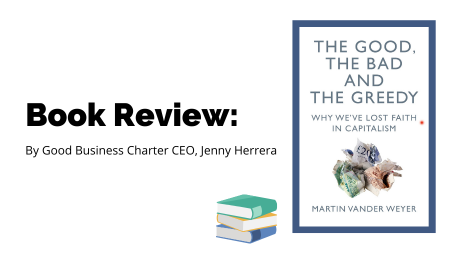Lost Faith in Capitalism – a Review of The Good, the Bad and the Greedy
10th June, 2022
I have recently finished reading Martin Vander Weyer’s informative analysis of why we have lost faith in capitalism in “The Good, the Bad and the Greedy” which at times had me plunged into despair at the scale of some of the issues that have arisen in recent decades, particularly in areas of governance such as payment of taxes and the dramatic rise in the CEO pay ratio. There does seem to be an inherent problem where individuals have acted recklessly and yet faded from the spotlight, still enjoying huge figure sums in pensions. It hardly sends out a resounding warning to others considering similar ways to be greedy.
Indeed, this felt like a big focus in the book – and the way the disconnect between bosses and workers has exacerbated the loss of faith in capitalism. Vander Weyer draws out a really useful comparison from two centuries ago between industrial Manchester and Birmingham to illustrate this. In the large factories of Manchester, it was apparently well known that the working people were at the mercy of the manufacturers and the unskilled workforce were merely a factor in their profit equations.
In Birmingham, however, there was more social mobility with successful small masters and highly skilled artisans moving up in the world whilst unsuccessful ones slipped downwards (p41). As Vander Weyer concluded, the tale of these two cities tells a great deal about the principles of good and bad business – as well as the fact that well-developed skills are always the workers’ best protection against exploitation and best hope of social and material advance.
As I read this section, I mused on a visit to GBC accredited Brompton Bicycles where I was treated to a tour round the factory by CEO Will Butler-Adams. It was great to see his obvious pride in the product they were so carefully manufacturing, and to learn of the way they upskill their workers on the factory floor into some really highly skilled roles. Just the fact that he was walking comfortably around the factory floor, greeting colleagues by name, shows that all important community of interest between owners, managers and workers that makes a business more humane, as Vander Weyer says.
In a lengthy section on tax, I of course rejoiced that this has such a focus, given that we have it as one of our 10 components and work closely with Fair Tax Mark and TaxWatch UK who are two sides of the coin in inspiring good tax behaviour and signalling out bad.
“One reason why many people have lost faith in capitalism is a belief that big companies don’t pay sufficient tax,” p175
Yes indeed. That is why we see it as just as important as caring for people and planet – and are concerned when it seems to be discounted. Ask people on the street and they will tell you a responsible business ought to be paying its proper taxes rather than taking advantage of the benefits power and influence can bring them.
Towards the end of the book, Vander Weyer addresses the question of purpose – including referencing various people I have encountered as I journey in this same arena. His opening sentence is “I’m worried about purpose” (p257). I must agree, which is why our focus is on responsible business behaviour which we feel is more concrete and comprehensible to ESG experts and the general public alike.
I loved his image of purpose having become “absurdly overburdened with ethical baggage, like a cartoon Mini with a wobbling stack of suitcases, furniture, pots and pans on its roof rack” (p257). It is his suggestions about hard metrics that seem to me to be more useful than talk of purpose – given that they can be explained and comparisons are possible. Experts have told him that this is what is needed to “give clarity to the thrust for sustainable, socially responsible business and, in doing so, to make the rising pressure from investors for ‘ESG compliance’ more transparent and meaningful: in effect, to tell boards of directors precisely what it is they are expect to do if they wish to remain both investable and socially acceptable.” (p280)
This, of course, is precisely what the Good Business Charter is seeking to do – provide that set of transparent, meaningful metrics, that gives clarity to boards of directors, and CEOs, Heads of Sustainability, and founders and managers of small businesses. A framework they can look at, readily understand, and work to achieve, in the process enabling them to apply for GBC accreditation which can act as a credible signpost of a capitalism that is not bad nor greedy, but good.
In a book that feels depressing at times as you look at the recent past, there is some encouragement that change is coming as articulated by the CEO of JPMorgan Chase & Co, that “major employers are investing in their workers and communities because they know it is the only way to be successful over the long term” (p265). May they give the same consideration to their policies on CEO pay, tax, ethical sourcing and their care for the environment. You leave out some of these key areas at peril and miss the wider point that can inspire the best sort of capitalism – care for workers, suppliers, customers and the environment whilst paying your fair share of tax.

